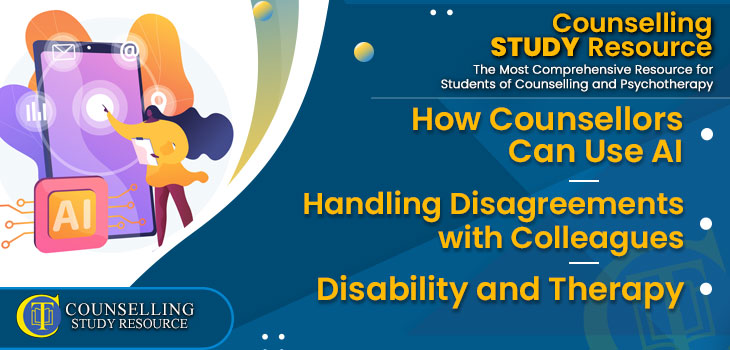271 – How Counsellors Can Use AI
Handling Disagreements with Colleagues – Disability and Therapy
In Episode 271 of the Counselling Tutor Podcast, your hosts Rory Lees-Oakes and Ken Kelly offer a warm welcome back after the academic break. With the start of the new academic year, we also have two new sections in the podcast:
- We start off with ‘Student Services’, delving into the world of being a student and studying counselling - supporting you along that journey. Today Rory and Ken are discussing the role artificial intelligence (AI) might play in the future, and how counsellors can use AI ethically.
- Then we have ‘Ethical, Sustainable Counselling’, looking at the day-to-day running of a private practice – we begin by looking at how to deal with conflict between colleagues.
- And finally our CPD section ‘Practice Matters’ makes its return – Rory speaking with Melanie Halacre about disability and therapy.
How Counsellors Can Use AI [starts at 03:22 mins]
Counselling Foundations is sponsored by
Counselling Skills Academy
Learn counselling techniques by seeing counselling skills used in real sessions by qualified therapists.
Real sessions - real-life presentations - real skills.
With the rising use of AI, it is clear it’s not something that’s going away anytime soon - what’s important is knowing how counsellors can use AI ethically and productively.
The key points of this section include:
- AI can be a really useful tool when used appropriately.
- Using it for support without making it do the heavy lifting for you.
- Counselling Tutor is working on putting together support and lectures on the ethical use of AI for counsellors.
- Counsellors can ask AI such as Chat GPT to summarise their own notes/handouts – this way it is still using their own work, but presenting it in a way that can strengthen it as another useful resource.
- Another way counsellors can use AI is by asking it to make a quiz for them to revise with – again using their own notes and resources, reworked into something new they can work with.
- AI has been around for a long time in things we might not even notice – ‘friendly AI’ such as the Google algorithm, Siri, Spotify, etc.
- ‘Will AI replace Counsellors?’ – Counselling is a career that requires person-to-person contact and connection. It requires empathy and a therapeutic relationship – it is unlikely that technology such as AI will be able to work with emotion in this way.
- However, we can still look at using AI within running our counselling practice in productive and ethical ways, such as working behind the scenes in invoicing, scheduling etc.
Handling Disagreements with Colleagues [starts at 23:40 mins]
Within counselling, it can be very helpful to have critical friends, an outside look at how you conduct your practice. However, this can sometimes lead to disagreements among colleagues that won't be in your clients best interest.
Some of the main points of this section are:
- It’s important to know how to handle moments of disagreement – and to see that they are dealt with, rather than being pushed aside and ignored.
- Think about the basis of the disagreement – does it live in ethics?
- Ask the person exactly what it is about your practice they disagree with, and then go away and reflect.
- Critique should always be backed up with information – looking at the ethical framework etc.
- Someone doing something in a different way to us doesn’t immediately make it unethical.
- We need to be open to the input of others.
- Notify and discuss feedback with your own personal supervisor.
- Write down the issue and place it aside. Come back to it later to assess if the issue is still as pressing.
- Is your opinion correctly informed? Or is it coming from your personal worldview?
A handout on Handling Disagreements with Colleagues is available for download in the green button above.
Disability and Therapy [starts at 39:45 mins]
The National Counselling Society is proud to sponsor Practice Matters.
NCS are really excited to have launched their Children and Young People Therapist Register for counsellors working with the younger age group.
In this week’s ‘Practice Matters’, Rory speaks with Melanie Halacre from Spokz People about disability in therapy.
The key points of his discussion include:
- It is important to think about diversity in regards to disability.
- Is your practice accessible for those with a disability?
- How many hours of training have you had on counselling those with a disability? You may want to consider seeking out further CPD in this area.
- For some people, they may have been turned down counselling numerous times. This may be because the counsellor doesn’t feel comfortable counselling someone with a disability, doesn’t feel they have the correct training, or don’t have an accessible place of practice.
- It goes beyond a practice being physically accommodating.
- It’s okay to feel initial discomfort over reaching out for this training, but we often require clients to go where it’s uncomfortable.
- Have discussions about what adjustments can be made to your practice in order to be more inclusive.
- Is online counselling the way forwards? For some people, yes; but for others, no. Some people would much prefer to be in the room with a counsellor, being able to see their body language, etc.


